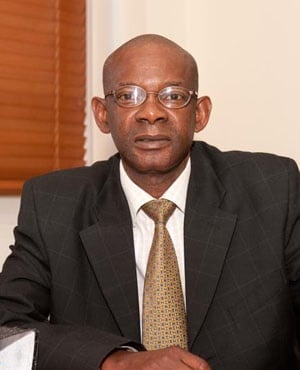He is known as a “serial actor” who never gets the big job after holding the horses while permanent heads are being sought.
Silas Ramaite is not new to filling the post of head of the National Prosecuting Authority (NPA) and has always been the go-to person when presidents mull over who should become the permanent National Director of Public Prosecutions (NDPP).
This is Ramaite’s third time treading the boards in the top job: the first was after Bulelani Ngcuka left office in 2004, and the second when Mxolisi Nxasana departed in 2015 after accepting a R17m golden handshake from former president Jacob Zuma, which he now has to pay back.
“He is an academic and has the fewest scandals among the deputy NDPPs,” a senior prosecutor cited as one reason Ramaite gets the acting job so often.
“But I know him as a person who is indecisive and does not have the guts to take decisions which may offend some people. I think that is his weakness – because he does not have the fortitude to take hard decisions which heads of prosecutions are often faced with.”
According to Ramaite’s colleagues, he is the best qualified for the position, armed as he is with a doctorate in law and conferred with senior counsel status. But his so-called indecisiveness poses a serious risk to the institution and its independence from political and outside influence.
“You cannot have a head of prosecutions who is afraid of facing a backlash if any arises from having taken tough decisions,” another senior prosecutor said.
“It comes as part of the task and, unfortunately, he lacks that.”
Yet another prosecutor who has worked closely with Ramaite said that since the days of former NDPP Ngcuka, when factions emerged splitting the prosecuting authority between the supporters and opponents of Zuma, Ramaite always remained neutral. But the price of his neutrality was the animosity he received from both factions.
“He goes with the wind and you will never know where he stands. At least with Shaun [Abrahams], being right or wrong, we knew where he stood,” said one prosecutor.
With Ramaite again in the acting position, the NPA is without one of four deputy directors of public prosecutions.
Another, National Prosecutions Services head Nomgcobo Jiba, is again under threat of suspension by President Cyril Ramaphosa after he announced his intention earlier this month to institute inquiries into her and Specialised Commercial Crimes Unit (SCCU) head Lawrence Mrwebi’s fitness to hold office.
In what is perhaps an indication of how much the institution has been hollowed out over nine years of Zuma’s rule, the NPA is also faced with a number of vacancies in critical positions. Ramaphosa will find it tough to find a new boss from within the NPA’s ranks. (See graphic)
DA MP Glynnis Breytenbach, a former prosecutor who worked in the SCCU, which used to fall under Ramaite’s control, accused him of having sat idly by while successive NDPPs and Acting NDPPs – including Mokotedi Mpshe, Menzi Simelane, Jiba and Abrahams – “systematically destroyed the fabric of the NPA and South Africa’s criminal justice system”.
“His track record proves that, at best, he is weak, vacillating and pliable,” she wrote in a statement shortly after Ramaite’s appointment.
Breytenbach said Ramaite has, in the past, defended decisions by Ngcuka not to institute corruption charges against Zuma despite saying there was prima facie evidence.
According to Breytenbach, Ramaite even went so far as to acknowledge his own co-responsibility on the issue, stating in 2004 that: “We had made the decision as a collective in the NPA and we stand by it”; and that: “It was not as if Bulelani sat there in the office and took decisions alone.”
Ramaphosa appointed Ramaite after the Constitutional Court nullified Abrahams’ appointment on Monday.
He has a long history with the NPA, having been appointed as Deputy National Director of Public Prosecutions in 2003.
His qualifications include B.Proc and LLB degrees from the University of Fort Hare, a master’s in law specialising in Criminal Law, Constitutional Law, Administrative Law and Public International Law, and a law doctorate in Constitutional Law.
He was admitted as an advocate of the Supreme Court in 1988 and was granted the status of Senior Counsel in 2001.
However, his powers were also eroded under Abrahams’ tenure.
Abrahams took the SCCU, which is currently responsible for managing investigations into state capture, away from Ramaite’s control and made the unit report directly to him. Ramaite remained in charge of administration and the Office for Witness Protection.
Ramaite has served the NPA in various positions throughout his career, including as an interpreter, court clerk, prosecutor, state advocate and senior state advocate.
Ramaite declined to be interviewed by City Press this week.
NPA spokesperson Luvuyo Mfaku denied claims that Ramaite was indecisive and unable to make tough decisions. The allegations, he said, were inconsistent with a man who was an evidence leader at the Goldstone Commission of Inquiry in 1991 into political violence, and who was the Attorney-General of the erstwhile Venda honeland.
“He is cited in case law and was also a magistrate. That is not a person who cannot take tough decisions or who is easily swayed,” he said.
“And when the Priority Crimes Litigation Unit and the SCCU fell under Ramaite, they had conviction rates of about 90%.”
TALK TO US
What kind of person does SA deserve as the National Director of Public Prosecutions?
SMS us on 35697 using the keyword NPA and tell us what you think. Please include your name and province. SMSes cost R1.50
